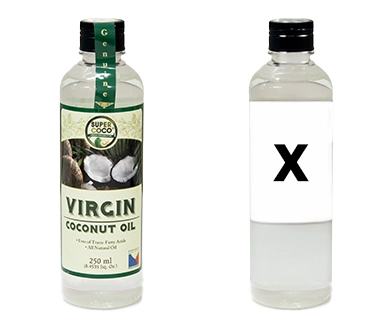Health Benefits of Coconut Oil vs. Other Oils


Virgin Coconut Oil |
Other Oils |
|---|---|
| • Chemical Structure • | |
|
92% Saturated NO missing pair of hydrogen atoms in its medium carbon chain, very stable, does not become rancid even in long storage, safe for cooking in high heat |
92% Saturated NO missing pair of hydrogen atoms in its medium carbon chain, very stable, does not become rancid even in long storage, safe for cooking in high heat |
| • Characteristics (Major Fatty Acids) • | |
|
Medium Chain |
Medium Chain |
| • Process • | |
|
Naturally Processed with minimum or no heat / Cold Processed or Cold-Pressed |
Refined, Bleached, Deodorized (RBD) |
| • Effect • | |
|
Anti-bacterial, anti-viral, anti-protozoal, anti-fungal, no trans fat; heart-healthy, immune boosting due to MCFAs, cosmetic & skincare uses, used as dietary supplement, healthiest oil to cook with. |
Retains all the health-giving properties of the MCFA. Best use as cooking oil and for industrial uses |
| • Age • | |
|
5,000+ years recorded used in food preparation with health benefits |
5,000+ years recorded used in food preparation with health benefits |
Sunflower Oil
Sunflower Oil
| Chemical Structure: |
89% Polyunsaturated 2-3 pairs of hydrogen atoms missing in its carbon chain make sunflower oil highly liquid but vulnerable to oxidation |
|
|
|
| Characteristics (Major Fatty Acids): |
LONG CHAIN: 65% Linoleic (reg), 82% Oleic (hybrid) |
|
|
|
| Process: |
Refined, Bleached, Deodorized |
|
|
|
| Effect: |
Causes good cholesterol, oxidation |
|
|
|
| Age: |
For 46 years, plants has been cultivated since its production in 16th Century |
|
|
|
Olive Oil
Olive Oil
| Chemical Structure: |
77% Monounsaturated 1 pair of hydrogen atoms missing makes oil less prone to oxidation. Its 14% saturates protect its oleic acid making it heart healthy |
|
|
|
| Characteristics (Major Fatty Acids): |
LONG CHAIN: 71% Oleic Acid |
|
|
|
| Process: |
Naturally Cold-Pressed |
|
|
|
| Effect: |
It becomes beneficial to our health if used as a salad oil or table oil. |
|
|
|
| Age: |
One of the oldest oils used by man. Records show that this oil is more than 5000 years. This oil is mentioned in the Bible. |
|
|
|
Peanut Oil
Peanut Oil
| Chemical Structure: |
48% Monounsaturated, Quite resistant to rancidity if handled properly |
|
|
|
| Characteristics (Major Fatty Acids): |
LONG CHAIN: 36% – 67% Oleic Acid |
|
|
|
| Process: |
Expeller Pressed or Solvent Extraction |
|
|
|
| Effect: |
Used as salad dressing |
|
|
|
| Age: |
100+ years |
|
|
|
Corn Oil
Corn Oil
| Chemical Structure: |
57% Polyunsaturated, 2-3 pairs of hydrogen atoms missing in its carbon chain makes corn oil highly liquid but vulnerable to oxidation |
|
|
|
| Characteristics (Major Fatty Acids): |
Refined, Bleached, Deodorized (RBD) |
|
|
|
| Process: |
Refined, Bleached, Deodorized (RBD) |
|
|
|
| Effect: |
Causes good cholesterol, oxidation |
|
|
|
| Age: |
81 years promoted as food oil |
|
|
|
Canola Oil
Canola Oil
| Chemical Structure: |
62% Monounsaturated, 1 pair of hydrogen atoms missing makes oil less vulnerable to oxidation |
|
|
|
| Characteristics (Major Fatty Acids): |
LONG CHAIN: 56% – 64% Oleic Acid |
|
|
|
| Process: |
Genetically modified rape seed Refined, Bleached, Deodorized (RBD) |
|
|
|
| Effect: |
Omega -3 is transformed into trans fats during RBD process |
|
|
|
| Age: |
30 years Biotechnology |
|
|
|
Soybean Oil
Soybean Oil
| Chemical Structure: |
54% Polyunsaturated, 2-3 pairs of hydrogen atoms missing in its carbon chain make soy oil highly liquid but vulnerable to oxidation |
|
|
|
| Characteristics (Major Fatty Acids): |
LONG CHAIN: 54% Linoleic Acid |
|
|
|
| Process: |
Refined, Bleached, Deodorized (RBD) |
|
|
|
| Effect: |
Causes good cholesterol, oxidation and has trans fats |
|
|
|
| Age: |
60+ years food agriculture |
|
|
|
Palm Oil
Palm Oil
| Chemical Structure: |
51% Saturated-Palm Oil (extracted from palm fruitlets), 82% Saturated-Palm Kernel Oil (extracted from kernel or seed) |
|
|
|
| Characteristics (Major Fatty Acids): |
LONG CHAIN (Palm Oil): 44% Palmitic |
|
|
|
| Process: |
Refined, Bleached, Deodorized (RBD) |
|
|
|
| Effect: |
Palm Kernel Oil is a good cooking oil because like coconut oil, it is a plant-based saturated fat with MCFAs |
|
|
|
| Age: |
5,000+ years as recorded with regards to use in food preparation |
|
|
|